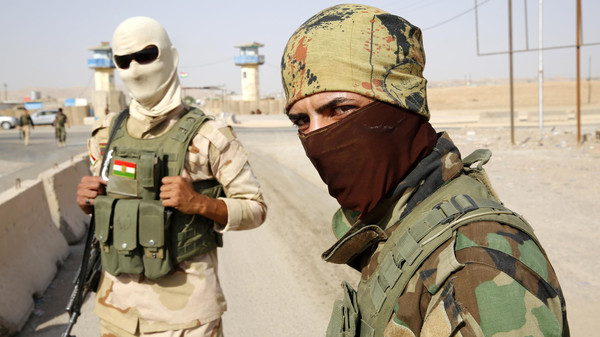
Members of the Peshmerga–Kurdish soldiers–guard a village in Iraq. Turkey is allowing Iraqi Kurds to pass its border with Syria to fight IS. But Turkish Kurds are not allowed, which may lead to more antagonism. Photo: Reuters via alarabiya.net
To say the least, the government of Turkey has long had a contentious relationship with the country’s Kurdish population. Turkey has barred its Kurds from entering Syria to join the fight against the Islamic State. But it fully supports Kurdish soldiers from Iraq, and is allowing them to cross the Turkish border into Syria to defend the border town of Kobane. Explaining this divergent attitude towards Kurds sheds light on the delicate cultural and political relationships is this increasingly volatile region.
Kurds make up about 15–20 percent of the Turkish population, and were in conflict with the government for decades. Clashes with the semi-political, semi-militant group Kurdistan Workers Party (PKK) resulted in 40,000 fatalities. Despite an uneasy truce reached in 2013 PKK is still considered a terrorist organization by Turkey, and the U.S. for that matter. As I wrote about in August, PKK has grown into a key player in pushing back IS advances in Iraq while its leader remains imprisoned in Turkey.
Within this context, Turkey has been resistant to allowing Turkish Kurds to join their brethren in Syria. (30 people have died resulting from protests to this stance.) PKK has an affiliated organization there, and the Turkish government is concerned that the two groups — if allowed to combine forces — could launch a strike against Turkey.
But Iraqi Kurds are a different story, and Turkey is allowing their fighters called Peshmerga to pass through on the way to Kobane in northern Syria. Why? According to BBC reports, it is a reflection of Turkey’s economic and resource ties to Iraqi Kurdistan.
Iraq is Turkey’s second largest export partner, and most of that trade is conducted with Kurdistan. The arrangement is partly due to the fact that Baghdad’s Shia-led government and Ankara’s Sunni one don’t get along too well. So business is focused in the north: A Turkish company constructed a new airport in the Kurdish center of Irbil. Plus, Turkey gets a substantial amount of oil from northern Iraq, about 120,000 barrels per day.
In addition, Turkey has come under pressure from the U.S. to oppose IS in Syria, allowing Iraqi Kurds to the front lines seems less of a risk. (Foreign Policy covers the strained U.S.-Turkish relationship and its impact on the IS conflict.) Put another way, “Kurds here [in Turkey] are still seen through the prism of the PKK, while the Peshmerga in Iraq are part of a semi-autonomous state with which Turkey can do business.”
In the end it all comes down to business. Fighting off IS in Syria will certainly be aided by bringing in the Peshmerga. However, Turkey is walking a fine line with its policies, and barring its own Kurds from entering Syria does not seem like an appropriate, or sustainable, policy. If it leads to more deaths in Turkey its problems with Kurdish resistance will only get worse.